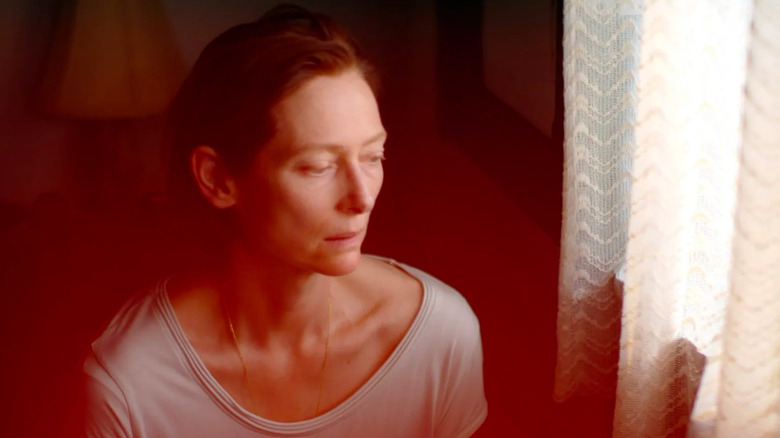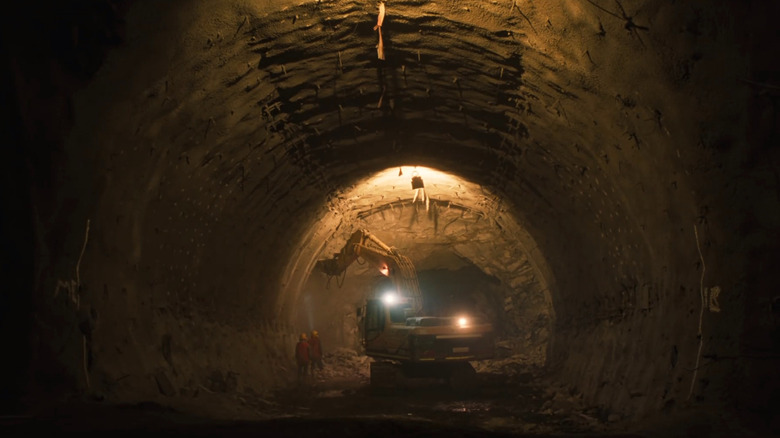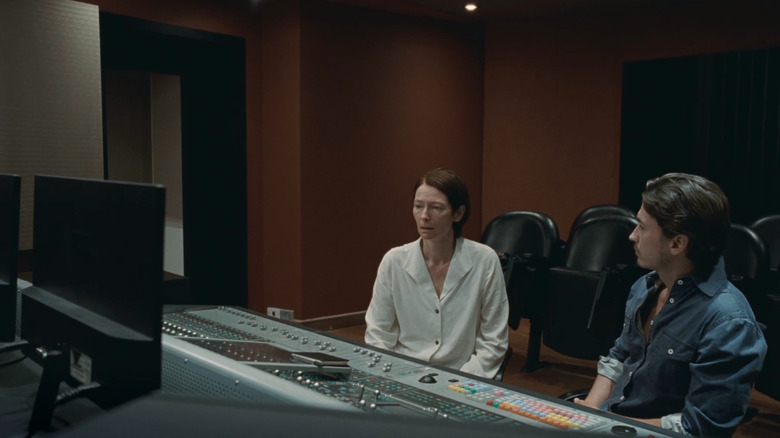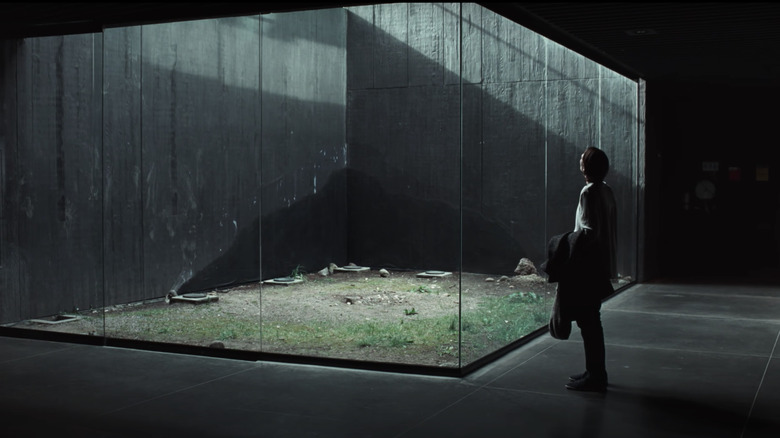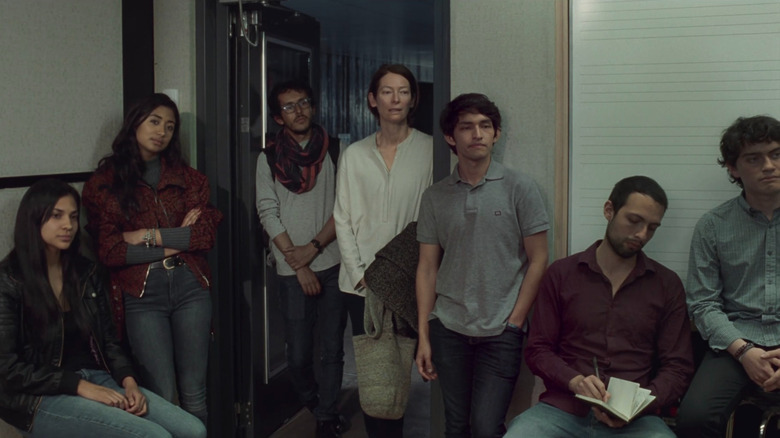Memoria Review: Past And Present Collide With A Contemplative Sonic Boom
Starring Tilda Swinton, "Memoria" is the movie you might have heard about that was originally slated for a never-ending theatrical release. The plot, which takes a backseat at times to the unfettered stillness of slow cinema, concerns a Scottish ex-pat named Jessica who begins hearing a mysterious sound no one else can hear in the jungles of Colombia. In 2021, the movie shared the Jury Prize at the Cannes Film Festival, where Thai writer-director Apichatpong Weerasethakul had previously won the Palme d'Or for his surreal 2010 drama "Uncle Boonmee Who Can Recall His Past Lives."
It's worth talking upfront about the film's unique release strategy because "Memoria" is a movie that you might need to do a bit of planning to see. NEON announced late last year that it would "only ever be available in cinemas," seemingly in a bid to get moviegoers actually going to the movies again and have them experience the film's intricate sound design in an immersive setting while theaters were struggling during the pandemic. The distributor subsequently walked back its plans to have "Memoria" only play one theater at a time, and in some countries, it has already enjoyed a theatrical run or been made available through video-on-demand services.
In the U.S. and Canada, however, "Memoria" is still rolling it out in different locations as part of a "roadshow-style film tour ... with special engagements in multiple cities each week as it travels around North America through the rest of the year." Jessica wakes one night as the unidentified sound comes crashing into her life; she scoots out of a chair and it punctures the silence with almost as much weight as a cacophony of car alarms going off outside. Moments like this play better when the viewer is fully submerged in the movie's soundscape.
'A rumble from the core of the earth'
"Memoria" is the Spanish word for "memory," and much of the dialogue in this film is in that language, with Jessica slipping into English more when her Spanish fails her. Yet "Memoria" is also a Latin term from classical Western rhetoric, whereby an orator would have to recall all of what they were going to say without any of the modern conveniences of reading off cue cards or teleprompters.
Technology does aid Jessica's attempts to understand the sound she hears, as she seeks out a sound engineer, Hernán (Juan Pablo Urrego), to try and reproduce it. When she first walks into his mixing booth at the recording studio, he asks her to sit and wait—and we wait with her, listening as the music he's working on plays all the way through.
In Spanish, Jessica describes the sound to Hernán as una bola enorme de concreto ... que cae en un fondo de metal ... rodeada de agua de mar ("a huge ball of concrete ... falling into a metal well ... surrounded by seawater.") In English, she calls it "a rumble from the core of the earth," and as they try to pinpoint the metallic echo of it through his library of sound effects, we rely as much on our memory of it as she does.
Later, when Jessica shows back up at the studio, Hernán has up and vanished, and no one there has any knowledge of him. It's as if he never existed in the first place. This is an example of how Weerasethakul weaves plot into the film, though it's not always his primary focus.
Form over content
In "Memoria," Jessica also encounters a 6,000-year-old skeleton, found in a tunnel with a hole drilled into its skull. Her sister, who is in the hospital when we first meet her, speaks of an "invisible," uncontactable tribe in the jungle who can seemingly cast spells, perhaps even make people sick or make them disappear. Yet it's as if Jessica, like Billy Pilgrim, has come unstuck in time and can no longer trust her own jumble of memories. A man she thought dead is spoken of as alive, while another, older man, also named Hernán (Elkin Díaz) appears later and claims he can remember everything that's ever happened in his life.
These are plot-based ideas that might sound like the beginnings of a thriller, but in "Memoria," they exist as tributaries of a larger stream of consciousness, where the form of the thing is almost as noteworthy as the content of its plot. This is an exercise in slow cinema, which values long takes, static shots where the camera sits and observes the same scene for minutes on end.
That style could prove challenging for viewers who are not familiar with it or equipped with the patience for it. Most movies are busy cutting back and forth between different things, even if it's just a different angle on the same scene. It's a trick to keep the eyes from getting bored that doubles as a kind of visual language where we identify with the perspective of the characters and what they're feeling based on how the shots are framed.
"Memoria" eschews close-ups and holds Jessica at a remove. She's almost always framed in relation to her surroundings via wide shots. When we finally do see an intimate close-up of her, it has more of an impact.
'A poem of the sleepless nights'
"Memoria" unfolds at a pace that could only be described as glacial—though not necessarily in a pejorative sense. There's something to be said for quieting one's mind and just being still or inhabiting that eerie lack of movement or sound. There's also something to be said for when the sound grows more insistent, cutting through the chirping of crickets with a sonic boom.
The film has an impressionistic flow to it, where it's not always clear how things connect or what the point of something is. That requires patience, and I can see how a casual viewer might come away from certain scenes feeling like they had just watched paint dry. At one point, the camera lingers long on a man as he lies in the grass with his eyes open, temporarily catatonic, sleeping without dreaming. Yet I don't imagine that the kind of cinephiles seeking this movie out would be the same ones who go to the movies only for car chases, or the sheer whiz-bang spectacle or being shown things in fast cuts.
There's a scene in "Memoria" where Jessica sits on a park bench with her friend, reciting a brief "poem of the sleepless nights." She takes her time delivering the lines, letting the last one hang in the air like an unfinished thought. The movie has a similar effect.
Music and a memory
One scene in "Memoria" has Jessica listening in on a live jazz session. We watch her watching the music, but Weerasethakul and cinematographer Sayombhu Mukdeeprom withhold sight of the musicians at first, just as they withhold sounds at times when all there is to do is see. The way Hernán says the name of his own punk/electronic band, I wasn't sure if I misheard it and it was the Depth of Delusion — or the Death of Illusion — Ensemble.
The camera hangs back out of earshot in a park, or over Jessica's shoulder in a cavernous library as she turns the pages of a book. It tracks her along the street or through a museum, sometimes walking or sitting behind her, always economical about when it cuts away or transitions to a different shot.
Though I'm someone who easily forgets music after hearing it once, the memory of that jazz piano melody wasn't lost to me like other tunes, even after all those other images above had come and gone. I carried it with me the next day, just as I did with "Memoria," an intriguing slice of arthouse cinema that offers less of a cut-and-dry narrative and more of a wandering experience through overlapping planes of existence and the liminal spaces between past and present.
"Memoria" is currently playing in select theaters. You can see the list of available screenings on the movie's official website.
